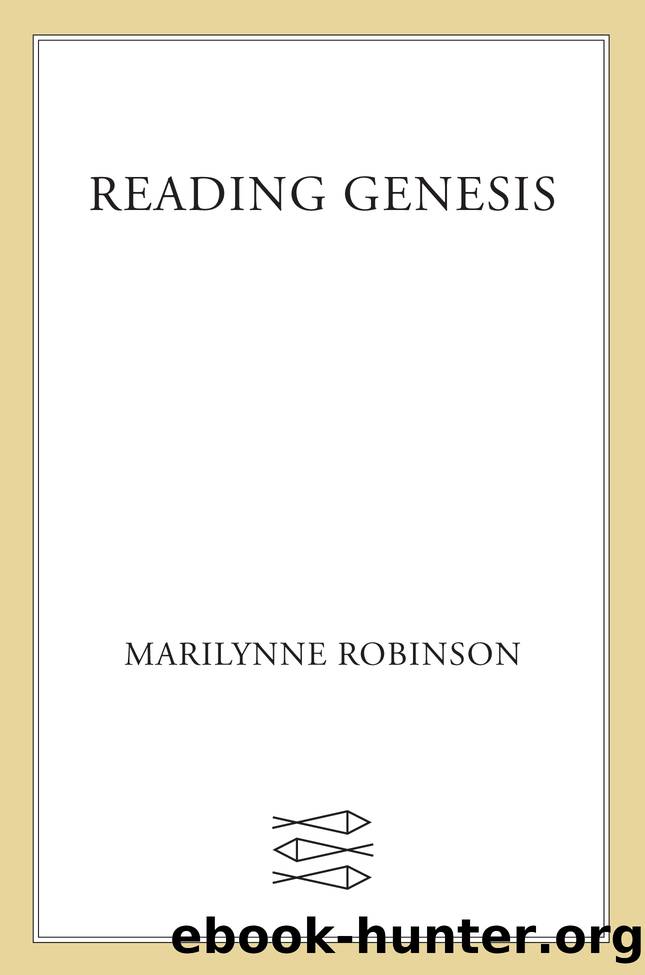Reading Genesis by Marilynne Robinson

Author:Marilynne Robinson
Language: eng
Format: epub
Publisher: Farrar, Straus and Giroux
* * *
I have dwelt on this sequence of stories, one after another, exploring the ways in which the faithfulness of God is manifest in the world of fallen humankind. This kind of interpretation might seem ingenious and little more if there were not essential truths lying behind it. The first of these is that these divine likenesses among whom we live are of the highest interest and value to God. We have been given the coin of wealth to barter among ourselves for the things we need or want. We assign worth to persons, consciously or not, and then to prestige and property and ease, all the things that compete so successfully with the claims of justice and righteousness, kindness, and respect, which would follow from a true belief that anyone we encounter is an image of God. And the second is that we do not know how to judge or where to blame because events are working themselves out at another scale and toward other purposes more than we can begin to grasp.
I am confessing my own anxiety here. I am as intent on magnifying the Lord as if I were a painter or composer, but my first obligation in commenting on the text is to be faithful to the text. Abraham and Sarah might be thought of as standing near the dawn with the brilliance of the original moment behind them. Their persons cast long shadows. This is a faulty metaphor for something true. The importance of the Abrahamic tradition, the billions of people who have variously claimed and revered the patriarch, is a matter of plain, historic fact. Much more is said about him in the Talmud and the Quran than in the Hebrew Bible, but all to the same effect, that he was a kind man, no idolator, faithful and obedient to the one God. In Islam, he is believed to have actively turned nations to monotheism. The Bible says nothing about this, but monotheism is firmly and uniquely associated with Abrahamâs name, so there is one important sense in which it is certainly true. Genesis tells us how this all began.
In the Letter to the Romans, Paul bases a crucial interpretation of Godâs way with humankind on the parsimony of the biblical account of Abraham. He quotes Genesis: âAbraham believed God, and it was counted unto him for righteousness.â Even Abraham did not achieve righteousness through his own virtues but received it in the eyes of God as a gift of God. This implies, on the one hand, that human meaning is not bound to what is done and suffered in this world. On the other hand, God loves and demands justice and kindnessâPaul struggles with the implications of these apparently irreconcilable truths, reconciling them in Christ. This is a difficult and contested locus in Christian theology, which I mention here only to make the point that the old Hebrew tradition of Abraham, carried on in the New Testament, makes the meaning of mortal Abraham rest in the choice and act of God.
Download
This site does not store any files on its server. We only index and link to content provided by other sites. Please contact the content providers to delete copyright contents if any and email us, we'll remove relevant links or contents immediately.
| Exegesis & Hermeneutics | New Testament |
| Old Testament |
The Five People You Meet in Heaven by Mitch Albom(2849)
Name Book, The: Over 10,000 Names--Their Meanings, Origins, and Spiritual Significance by Astoria Dorothy(2496)
Real Sex by Lauren F. Winner(2480)
The Holy Spirit by Billy Graham(2425)
The Secret Power of Speaking God's Word by Joyce Meyer(2257)
0041152001443424520 .pdf by Unknown(2228)
How The Mind Works by Steven Pinker(2221)
ESV Study Bible by Crossway(2135)
Ancient Worlds by Michael Scott(2107)
The Meaning of the Library by unknow(2073)
The Gnostic Gospels by Pagels Elaine(2033)
Churchill by Paul Johnson(2016)
MOSES THE EGYPTIAN by Jan Assmann(1977)
The ESV Study Bible by Crossway Bibles(1954)
Jesus by Paul Johnson(1892)
The Nativity by Geza Vermes(1853)
Ancient Near Eastern Thought and the Old Testament by John H. Walton(1851)
The Complete Dead Sea Scrolls in English (7th Edition) (Penguin Classics) by Geza Vermes(1845)
City of Stairs by Robert Jackson Bennett(1832)
